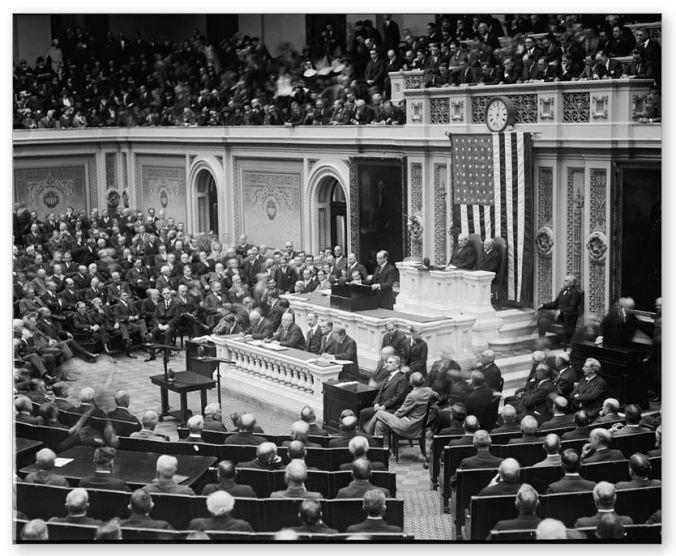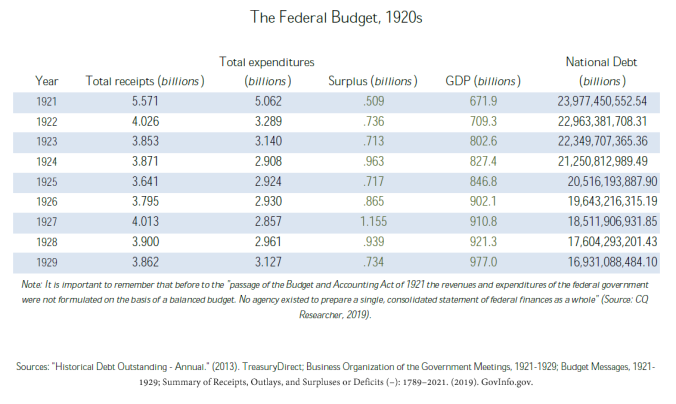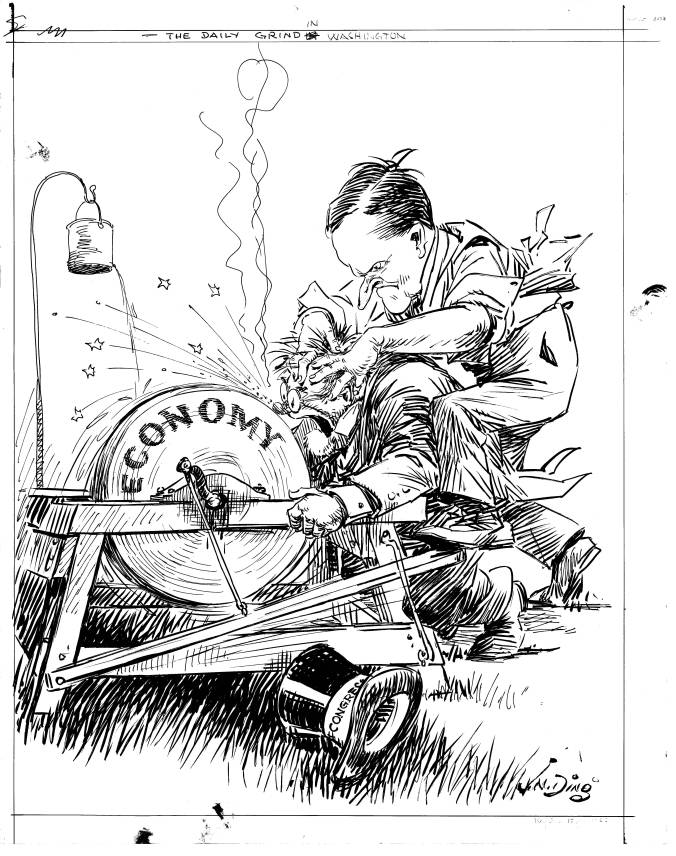
President Coolidge addressing both houses of Congress, December 6, 1923.
“Our main problems are domestic problems. Financial stability is the first requisite of sound government. We cannot escape the effect of world conditions. We cannot avoid the inevitable results of the economic disorders which have reached all nations. But we shall diminish their harm to us in proportion as we continue to restore our government finances to a secure and endurable position. This we can and must do. Upon that firm foundation rests the only hope of progress and prosperity. From that source must come the relief for the people.
“This is being accomplished by a drastic but orderly retrenchment, which is bringing our expenses within our means. The origin of this has been the determination of the American people, the main support has been the courage of those in authority, and the effective method has been the Budget System. The result has involved real sacrifice by department heads, but it has been made without flinching. This system is a law of the Congress. It represents your will. It mus be maintained, and ought to be strengthened by the example of your observance. Without a Budget System there can be no fixed responsibility and no constructive scientific economy…” — Calvin Coolidge, Annual Message to joint session of House and Senate, December 6, 1923.
![Memorial Continental Hall, 17th and D Streets, NW [Washington, D.C.]](https://crackerpilgrim.com/wp-content/uploads/2019/07/memorial-continental-hall-17th-and-d-streets-nw-washington-d.c..jpg?w=676)
Memorial Continental Hall, Washington: Where the departments of the federal government once met annually as the Business Organization of the Government to report on the previous year’s budget and prepare for the year to come in accordance with the Budget and Accounting Act of 1921, that law establishing “a single, consolidated statement of federal finances as a whole.”
“We must have no carelessness in our dealings with public property or the expenditure of public money. Such a condition is characteristic either of an undeveloped people or of a decadent civilization. America is neither. It stands out strong and vigorous and mature. We must have an administration which is marked, not by the inexperience of youth, of the futility of age, but by the character and ability of maturity. We have had the self-control to put into effect the Budget System, to live under it and in accordance with it. It is an accomplishment in the art of self-government of the very highest importance. It means that the American Government is not a spend-thrift, and that it is not lacking in the force or disposition to organize and administer its finances in a scientific way. To maintain this condition puts us constantly on trial. It requires us to demonstrate whether we are weaklings, or whether we have strength of character. It is not too much to say that it is a measure of the power and integrity of the civilization which we represent. I have a firm faith in your ability to maintain this position, and in the will of the American people to support you in that determination. In that faith in you and them, I propose to persevere. I am for economy. After that I am for more economy. At this time and under present conditions, that is my conception of serving all the people…” — To the 7th regular Meeting of the Business Organization of Government, Memorial Continental Hall, June 30, 1924.
We cannot call ourselves mature, and continue to spend as we do through our national representatives. Our actions are not those of the strong and wise but unmistakable signs of the feeble and weak, dissolute and backward, alternating pathetically between the inexperience of youth and the futility of age. Our cowardice on spending has turned the art of self-government into Dorian Gray’s horrific portrait, as all the while we refuse to see the rot within and wish only to gaze upon that fair complexion we would that we could wear forever to cover the true cost of our deeds. We feel we can keep postponing our trial indefinitely and never face a final reckoning or ultimate accounting. We accelerate with the confidence that it will be someone else’s problem to pay the bill some day. Without the will of the American people, the courage of those sent to represent them, sincere recommitment to transparent Budgeting, and the unflinching sacrifice all of this requires of everyone, this confidence has a point and will only continue unchallenged and unchecked to the devastation of us all. On this path, we are the antithesis of civilization. Our carelessness will cost us everything we have, all those things upon which we rely now will wilt and die. They are already dying faster than we realize. No defense complex will save us then. Reelection chances, government pensions, committee seats, and fundraising goals will be the last of our worries at that hour. By seeking to live against borrowed time and to have against indebted means, we will find a reaping of what we have sown comes sooner than all our best-laid attempts to forestall it.

Old Cal saw it coming and did something about it in his day. Moreover, he took action during an unmistakably robust economic boom when government revenues and GDP could have easily furnished an excuse to do nothing about deficits or the debt problem at all. Yet, as we blissfully sit back and continue kicking the can down the road, we mock him as a do-nothing. What total disaster, right around the corner, will history record in our liability column which could have been avoided had we done a fraction of what Coolidge did to rein in run-away spending and restore discipline? Perhaps we should look in the mirror first and when we have taken inventory of what reflects back at us, we might just begin to exert half the measure of his focused effort and courageous action.

“The daily grind in Washington” by ‘Ding’ Darling, January 15, 1925. Reproduced courtesy of the “Ding” Darling Wildlife Society.